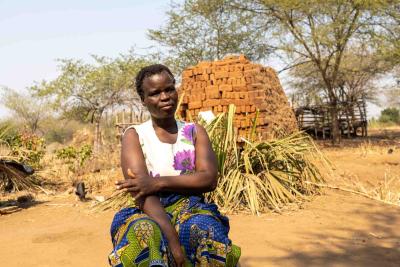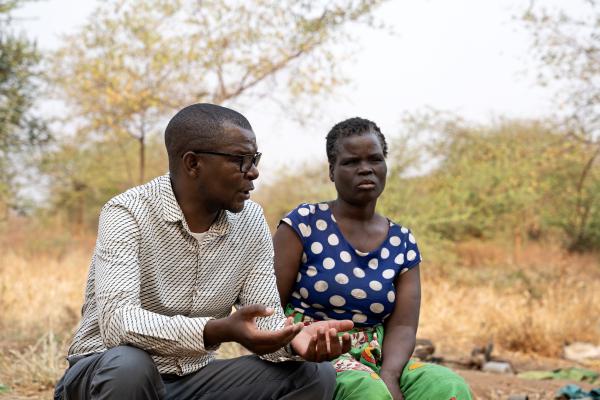Mental disorders are characterized by a disturbance in individual’s cognition, emotional regulation, or behavior. These are usually associated with distress or impairment in important areas of functioning. According to World Health Organization (WHO) report (8 June, 2022), one in eight people in the world live with a mental disorder. However, mental health patients in several parts of the world have limited access to care. This has led to severe human rights violations, discrimination, and high levels of societal stigma towards people suffering from mental health
The story of Linda
The story of Linda Zamba (Pseudonym) , 43, a mother of 5 from Jonasani Village, T/A Mlauli in Neno District is not different from the stories of several other mental health clients in Malawian societies dealing with the impact of their illness including societal discrimination. However, Linda’s story took an exciting turn in August 2022 after the Nutrition Coordinator for Partners In Health Malawi (PIH), locally known as Abwenzi Pa Za Umoyo (APZU), Charles Marshal, identified her from her home and referred her to an APZU Mental Health Manager, Waste Kayira for assessment and treatment.
In 2017, Linda started experiencing signs of mental illness while staying in Salima where she was conducting her restaurant business before she decided to move to Neno district to stay with her relations. However, her family members did not really understand what was happening to her and never took the initiative to seek medical help, rather they discriminated her in most instances. It was around this same period that Linda’s health started deteriorating due to inadequate care.
The treatment for Linda
On 11th August, 2022, Kayira made an initial assessment at Linda’s home and established that she indeed had mental illness. A reassessment revealed that Linda had a mental health condition known as Schizoaffective Disorder. Psychosocial factors were identified as the major factors that precipitated the onset of illness and she was prescribed with an antipsychotic and a mood stabilizer to improve her condition.

Linda has faced significant mental health challenges and has been recovering through a series of one-on-one mental health sessions with PIH Malawi mental health experts.
Angella Semu
According to Kayira, Linda responded well to treatment within a short period of time. However, she repeatedly experienced side effects from the medication. Following this, psychoeducation and reduced dosage was introduced to her. This improved the symptoms significantly.
“The client was put on medications and her family including her daughter and brother were also enrolled on ongoing counselling sessions. APZU also offered the client a monthly recurrent financial support to help her with other basic needs in her home.
“Linda has physically and mentally improved now. She has regained weight, restored relationships, and she is now more dependable as compared to the time when she was not under the medical and social care from APZU,” said Kayira.
Linda’s daughter who is also her guardian, Grace Phiri (pseudonym), commended APZU for the support rendered to her mother. She disclosed that her mother’s condition has improved greatly since she started receiving treatment and her mother is now able to help her look after their home.
“When I saw my mother after we moved from Salima, I was convinced that we were going to lose her. Her health deteriorated and I could barely recognize her. Nobody wanted to associate with her at that time because of her condition and she was put in her own small house which eventually fell when we experienced heavy rains. Afterwards, we started staying in a kraal like house,” explained Grace.
“When the doctors visited us the first time, we did not really have so much hope of seeing her getting better as it looked as though her condition was beyond reversal. However, after sometime we noticed some significant changes and now she is nearly back to normal all because of the unwavering support that APZU has been offering,” she continued.
Meanwhile, APZU is screening patients for depression in Integrated Chronic Care Clinic (IC3) in Neno district and antenatal clinic at Nsambe Health Center. All patients identified with mental health problems are immediately put on treatment, either medical or counselling or both. Some are referred to Zomba Mental Hospital for further management.
Other mental health services that APZU is providing
The organization is also carrying out community awareness campaigns on mental health, providing orientations on mental health to different key stakeholders in the district like health workers, faith leaders, police officers, health surveillance assistants, community health workers, prison waders, as well as training health workers and other stakeholders in Psychological First Aid in the district and beyond to help during natural disasters.
According to Neno District Non-Communicable Disease (NCD) Coordinator, Haules Zaniku, as of September 2023, Neno had 816 patients receiving care from skilled mental health experts in all health facilities across the district. These are patients with different conditions including depression, anxiety, bipolar, psychosis, schizophrenia, substance use and epilepsy among others. He commended APZU for the support in ensuring that community members in Neno district have access to mental health treatment.
“Currently, we are working with APZU only to provide mental health care services in Neno. They have done so much from bringing mental health experts who assist us in the provision of these services to supporting in supplying of medication needed for our mental health patients. They also support in community awareness programs and many other areas,” said Zaniku
Zaniku added that government is currently advocating for integration of mental health services into primary and secondary care. As such, it is improving the capacity of primary health care workers by increasing their knowledge and skills through supporting in-service training and increasing mental health literacy to the communities and allocation of resources for mental health.
Background of mental health care at APZU
Mental health activities at APZU started in 2007 focusing on treatment of psychiatric patients identified at the out-patient services, in-patient services, and in the outreach clinics. Mental health clinics at Neno District Hospital and Lisungwi Community Hospital provided support to patients with severe mental health conditions and epilepsy which led to the growing need for experts; hence the coming in of two mental health clinicians located at Neno District Hospital and Lisungwi Community Hospital respectively.
In 2018, the APZU Cross-Site Mental Health Program acquired a grant from Many Voices to fund mental health activities in all PIH sites. This was the genesis of the project on screening and treatment of perinatal depression using both medication and psychotherapy. In 2021, APZU got another grant to carry out a study called Depression Clinical Trial, to screen and treat depression among recipients of care followed up in a model Integrated Chronic Care Clinic (IC3) in the district using the same interventions of medications and psychotherapy.
On 10th October 23, APZU joined MoH and relevant stakeholders in the national commemoration of the 2023 World Mental Health Day that was held at Zomba Mental Hospital in the southern region of Malawi under the theme “Mental health is a universal human right”. At district level, APZU coordinated with Neno DHO to commemorate the day at a function that took place at Ligowe Community round on 31st October, 2023.
